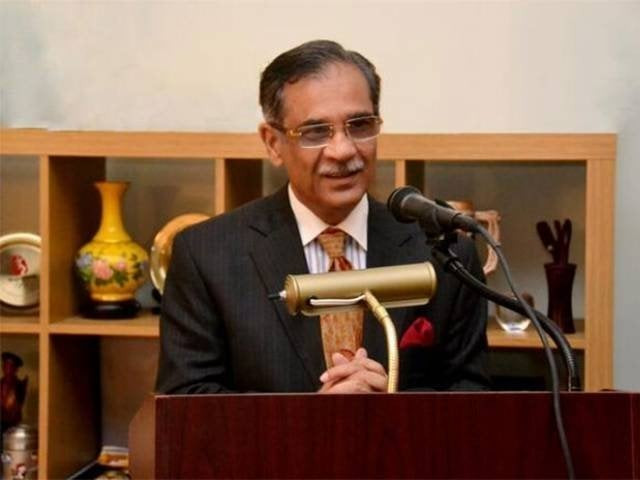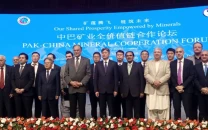Offshore tax amnesty gets political backing
Govt not agreeing with curbs proposed by SC-made panel

PHOTO: FILE
These recommendations are part of the report that a three-member committee of bureaucrats submitted in the Supreme Court over two weeks ago. The court had set up the committee headed by the State Bank of Pakistan (SBP) Governor Tariq Bajwa to find a way forward to ‘trace and bring back to Pakistan bank accounts and properties held abroad”.
However, both the political leadership and the bureaucrats are unanimous on the proposal of offering one-time offshore tax amnesty scheme to all Pakistanis, asking them to get their hidden foreign assets legalised at low tax rates. Pakistan has long been facing the challenge of bringing back assets that its citizens have kept abroad by exploiting legal lacunas.
The sources said a meeting was held in the Prime Minister’s Office before the finalisation of the report. The meeting was attended by Prime Minister Shahid Khaqan Abbasi, his advisers and assistants on economic affairs, SBP governor, the Federal Board of Revenue (FBR) chairman and secretary finance.
During the meeting, there was unanimity of the views on the need of giving the offshore tax amnesty scheme. But the bureaucracy and the political leadership remain divided over its contours, said a source in the Finance Ministry. He said the prime minister was not in favour of imposing restrictions on tax-free inflows of remittances and withdrawal of secrecy from foreign currency accounts.
But in its 30-page report the committee has recommended making stringent the existing legal framework for holding and transferring of foreign exchange abroad and in Pakistan, terming the present regime ‘too liberal’.
CJP wonders if convicted party chief can run affairs from jail
The committee has proposed to stop the deposits of foreign exchange that is purchased from the open market into the foreign currency accounts maintained in Pakistan.
It has also proposed stopping the misuse of Section 111(4) (a) of the Income Tax Ordinance, which is currently used to whiten illegally-obtained money from Pakistan by declaring the funds to be foreign remittances.
In its report, the committee noted that the analysis of the data of the ten largest banks for the fiscal year 2016-17 showed that only 2% of the remittances were above Rs10 million thresholds per person per annum. The committee has suggested capping the question-free tax-free flow of foreign remittances to a reasonable level.
The sources said the political leadership also did not want to withdraw the protection available to the foreign currency account holders from probing by the FBR and other government agencies.
“The other most common formal channel used to transfer foreign exchange abroad is through foreign currency accounts,” said to the report.
Any person can buy foreign exchange from the exchange company in Pakistan, deposit it in his foreign currency account and then transfer it anywhere in the world.
It noted that Sections 4 and 5 of the Protection of Economic Reforms Act 1992 and Section 3 of the Foreign Currency Accounts Protection Ordinance give absolute freedom to all these account holders.
Moreover, entities engaged in export business in Pakistan are legally allowed to retain 2% to 35% portion of export proceeds in their special foreign currency accounts.
“The report is the considered view of the committee and it is meant for the Supreme Court,” said a member of the committee while speaking on condition of anonymity. “It is up to the Supreme Court and the federal government whether they accept the committee’s recommendations or not.”
Dr Senator Musadik Malik, who is spokesman of the PM, was not available for comments.
CJP takes a break on suo motu action
The committee co-opted members from the Security and Exchange Commission of Pakistan, the Federal Investigation Agency, the National Accountability Bureau, the Intelligence Bureau and the Ministry of Foreign Affairs.
Hurdles in way forward
The government has not yet finaliszed the legal structure for implementing the proposed offshore tax amnesty scheme. The options in front of it are promulgation a presidential ordinance, bringing a special law in the parliament before budget or bringing the scheme as part of the Finance Bill 2018-19.
The sources said the PM was in favour of the ordinance but this option may not be used as the next fiscal year’s budget will be announced on April 27. There are also problems in making the amnesty scheme part of the Finance Bill, as the proposed scheme also requires amendments in other laws.
These laws are the National Accountability Ordinance 1999, the Foreign Exchange Regulations Act 1947, the Income Tax Ordinance 2001, the Prohibition of Benami Transactions Act 2017, the Federal Investigation Agency Act 1974 and Companies Act 2017.
All these laws cannot be amended through the Finance Bill, as in case of Finance Bill the Senate does not have the voting right. The sources said the only remaining option is to bring a special law in the parliament but its timing is the critical factor.



















COMMENTS
Comments are moderated and generally will be posted if they are on-topic and not abusive.
For more information, please see our Comments FAQ